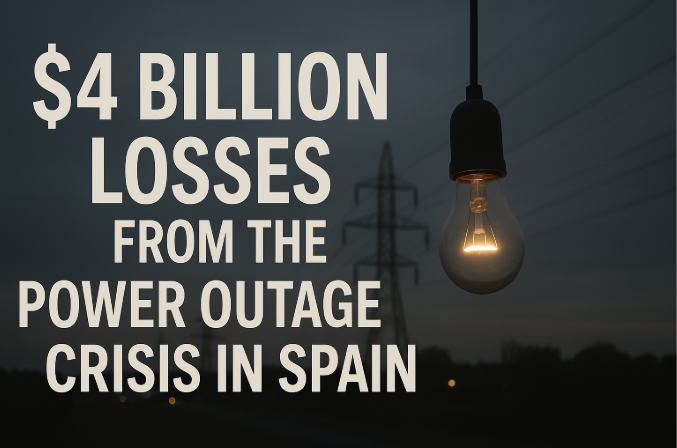
$4 billion losses from the power outage crisis in Spain
On April 28, 2025, at precisely 12:33 PM CEST, Spain experienced an unprecedented power outage that plunged the nation into darkness within seconds. This massive blackout, which also affected Portugal, Andorra, and parts of southern France, disrupted the lives of millions and exposed critical vulnerabilities in the country's energy infrastructure. The economic repercussions are staggering, with losses estimated to exceed $4 billion, prompting urgent discussions about the resilience and future of Spain's power grid.
The Immediate Impact: A Nation Paralyzed
In a matter of five seconds, Spain lost approximately 15 gigawatts of electricity generation—about 60% of its national demand at that moment. This sudden drop led to a cascade of failures across the Iberian Peninsula, leaving cities without traffic lights, halting public transportation, and causing widespread communication breakdowns. Hospitals relied on backup generators, while emergency services scrambled to respond to the crisis.
The blackout's reach was extensive: airports like Madrid-Barajas and Barcelona-El Prat faced operational halts, metro systems ceased functioning, and countless individuals were trapped in elevators and trains. The disruption extended to essential services, with internet connectivity dropping to just 17% of normal usage.
Economic Fallout: Billions Lost
The financial toll of the blackout is profound. Spain's supermarket industry reported significant losses due to spoiled goods and halted operations, leading to calls for a national crisis plan to prevent future occurrences.
Consumer spending plummeted by 34% on the day of the outage, as electronic payment systems failed and businesses closed their doors. The hospitality and retail sectors, particularly small businesses, bore the brunt of the economic impact, with many lacking the resources to mitigate such disruptions.
Investigating the Cause: A Complex Puzzle
Determining the exact cause of the blackout has proven challenging. Initial reports from Red Eléctrica de España (REE) indicated a sudden disconnection of power generation in southwestern Spain, leading to a rapid imbalance between supply and demand.
While some speculated about cyberattacks or rare atmospheric phenomena, authorities have ruled out these possibilities. The focus has shifted to the structural vulnerabilities of the power grid, particularly its capacity to handle the increasing share of renewable energy sources, which currently account for over 58% of Spain's electricity generation.
Renewable Energy: A Double-Edged Sword
Spain's commitment to renewable energy has been commendable, positioning the country as a leader in sustainable power generation. However, the blackout has highlighted the challenges of integrating intermittent energy sources like wind and solar into the existing grid infrastructure. Unlike traditional power plants, renewable sources lack the mechanical inertia needed to stabilize the grid during sudden fluctuations.
The incident has sparked debates about the pace of Spain's energy transition and the need for investments in grid modernization, energy storage solutions, and enhanced interconnections with neighboring countries to ensure stability.
Political and Public Response: A Call for Action
In the aftermath of the blackout, Prime Minister Pedro Sánchez declared a state of emergency and convened a crisis committee to address the situation. The government has initiated a comprehensive investigation into the causes of the outage and is considering reforms to bolster the resilience of the power grid.
Public sentiment has been mixed, with many expressing frustration over the lack of clear communication during the crisis. A survey conducted by the Centro de Investigaciones Sociológicas revealed that nearly 60% of Spaniards found the government's information insufficient.
Lessons Learned and the Path Forward
The 2025 blackout serves as a stark reminder of the critical importance of a robust and adaptable energy infrastructure. As Spain continues its transition toward renewable energy, ensuring the reliability and stability of the power grid must be a top priority. This includes investing in smart grid technologies, enhancing energy storage capabilities, and strengthening international energy cooperation.
Furthermore, the incident underscores the need for comprehensive emergency preparedness plans that encompass not only technical solutions but also effective communication strategies to keep the public informed during crises.
SEO Optimization Paragraph
In light of Spain's recent power outage crisis, it's evident that energy infrastructure resilience, renewable energy integration, and grid modernization are critical topics for discussion. As the nation grapples with the challenges of transitioning to sustainable energy sources, understanding the complexities of power grid stability, energy storage solutions, and emergency preparedness becomes increasingly important. Stay informed about the latest developments in Spain's energy sector, including renewable energy advancements, grid infrastructure investments, and policy reforms aimed at preventing future blackouts.